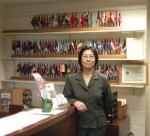Foreign concepts

The English Language Institute has had its share of troubles.
In January, three of its staff members were fired when $275,000 in university assets were found in an ELI office. More recently, two ELI students were detained after they boarded a bus bound for a local high school.
To some, the students’ arrests raise the question of whether those in the program are being taught everything they should know about American culture and getting around in a foreign country.
Shakir Mohsen Alsidran and Mana Saleh Almanajam were arrested because – according to Ahmed Bedier, director of the Central Florida Council on American-Islamic Relations – they wanted to see Wharton High School in an effort to immerse themselves in American culture.
“What they were trying to do on Friday is get exposed to the rest of the community and go see what a high school is like,” said Bedier, who speaks Arabic and was the first to meet with the two students after they were detained.
Bedier also said the two students had to seek out ways to expose themselves to American culture because the ELI did not provide the means to do so.
“My understanding is they did not receive any orientation in civics or any off-campus activities,” Bedier said. “(The ELI) mainly focused on academics and as far as English, there’s not social or off-campus responsibilities or the ‘do’s and don’ts’ type of thing.”
Other ELI students expressed the same concern.
“I like it so far, but now it’s kind of boring,” said Enad Mashar, a 24-year-old ELI student from Saudi Arabia. “Because there’s a lot of Saudis, so I will not improve my English, I will talk in Arabic between class and in the classes, after class – a lot of Arabic speaking – so I couldn’t practice my English more and more.”
Mashar is also a student ambassador, one of the ELI students responsible for helping new students in the program during orientation and answering any questions they might have. The ambassadors also help students who experience culture shock. Wei Zhu, the ELI’s interim director since January, said ambassadors are only part of the assistance the institute provides.
“We also have advisers that are available to answer students’ questions, and the teachers here, a lot of them have lived in different countries,” Zhu said. “We have many resources and many ways in which we address culture.”
Some students, such as Andrea Villegas, have found the staff to be very helpful. Villegas was born in Columbia and has been in ELI since December of 2005.
“I like the ELI,” said Villegas, who is thinking about attending USF. “The best thing about ELI is that if you have any problems or need help with something, they always help you.”
Davale Sahal from France has been in the program since last summer.
“It was really great, it was really helpful,” he said, though Sahal admitted that living with an American friend made his transition easier.
Zhu also said that there is a “culture component” in each of the five levels a student needs to take to complete the program. Each student takes a placement test to decide what level they should begin – Level V is the last level a student needs to complete the program.
Alsidran and Almanajam are in Level II, which includes classes in grammar, literature, listening/speaking, pronunciation and cultural contacts.
Zhu couldn’t answer why the students would go to a local high school to understand culture when the ELI offers numerous programs to help students do exactly that, choosing instead not to comment on specific students.
According to Teresa O’Donnell, executive director of the Commission on English Language Program Accreditation, the ELI has already been under review following the financial troubles the institute faced earlier this year. The ELI is up for reaccredidation, a process that begins a year and a half before the member institution’s accreditation expires.
As of now, Zhu said there are sufficient activities an ELI student can participate in to further their education in English language and culture.
Bedier said he plans to speak USF officials about the large number of English-studying Muslim students who are unfamiliar with the American way of life.
“I do intend to follow up with them and use this as an example of a need for cultural competency on campus,” Bedier said.






